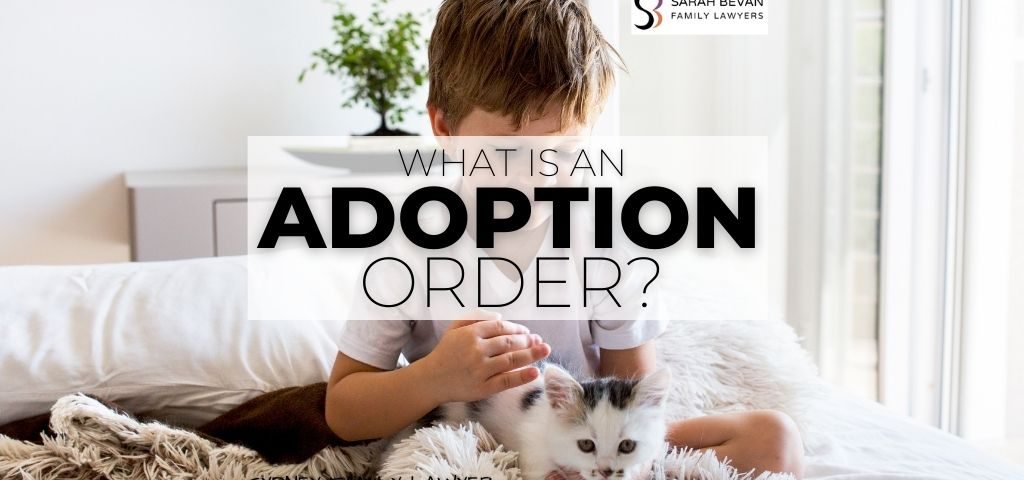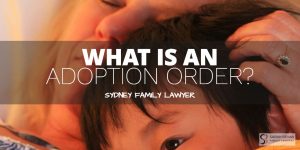- Sydney Family Lawyers
- (02) 9633 1088
- mail@sbfamilylawyers.com.au
What is an Adoption Order?
What is an Adoption Order – Adoption Lawyers Sydney
An adoption order is an official Court order made by the Supreme Court (in New South Wales) where the Court is satisfied the prospective parents named in an adoption application are suitable as adoptive parents, and placing the child in the care of the adoptive parents is in the best interests of the child.
Obtaining an adoption order can be extremely difficult and it is essential to speak with an expert family lawyer when considering making an adoption application.
Effect of an Adoption Order
Where an adoption order is made, the effect is that at law the child is recognised as the child of the adoptive parents, and the adoptive parents are recognised as the parents of the adopted child. The relationship is recognised as if the child had been born to the adoptive parents.
The legal relationship between the child and his or her birth parents (as parents and child) is generally terminated.
Where a child is adopted by the spouse or de facto spouse of the child’s birth parent, the relationship between that parent and the child is unaffected. Following an adoption, the child’s family relationships are determined according to the adoptive relationship.
In New South Wales, adoption orders are made and effected by the Supreme Court.
Where an adoption order is made, the Supreme Court provides the Department of Communities & Justice (DCJ) with a certified copy of the order, and the NSW Registry of Birth, Deaths and Marriages is authorised to issue an amended birth certificate recognising the child as a member of the adoptive family.
Where an adoption order is made, any existing guardianship of the child and any previous adoption order ceases to operate. A child will cease to be a child of the birth parents and will become a child of the marriage or relationship of the adoptive parents.
What is the effect of an adoption order?
In New South Wales and Victoria, the effect of an adoption order is to provide:
- The adopted child with the same rights in relation to the adoptive parent(s), as a child born to the adoptive parent(s)
- The adoptive parent(s) with the same parental responsibility as the parent(s) of a child born to the adoptive parent(s)
- The adopted child with legal recognition as the child of the adoptive parent(s) and they are regarded in law as the parent(s) of the adopted child.
The child’s name must be approved by the court in an adoption order upon application by the adoptive parents. If both parents have the same surname, the child will normally have that surname.
The child can also have the surname nominated by the parents and approved by the court.
An adoption order made in accordance with the law of an Australian jurisdiction, as long as it has not been rescinded, will be recognised in every other jurisdiction of the Commonwealth and will have the same effect as an adoption order made in the jurisdiction which recognises the adoption.
Adoption Orders made Overseas
Where an adoption is made overseas it will not have effect in Australian jurisdictions unless the overseas adoption is recognised as valid in the Australian state or territory.
If the overseas adoption is recognised as valid, it will have the same effect as an order made under the law of a State or territory of Australia.
An application may be made to the relevant Court in a state or territory for a declaration that the overseas adoption order is valid.
When is an overseas adoption order valid?
An overseas adoption order will usually be valid where:
- It was effective according to the law of the country in which it was made;
- That country was the usual place of residence of the adoptive parents or
- The official with responsibility for the administration of adoption in a state or territory or the principal officer of an approved overseas adoption organisation has, before the adoption in the other country, agreed to the placement of the child with the adoptive parents and the child is placed with them.
What does the court need to make an adoption order?
A court will not make an order for adoption unless the court is satisfied that:
- As far as practicable and having regard to the age and understanding of the child, the wishes and feelings of the child have been ascertained and due consideration given to them
- All appropriate consents have been provided and
- That the prospective parents are approved persons
What is an Adoption Plan?
An adoption plan sets out an agreement between two or more parties and may include:
- How information regarding the child will be exchanged
- If and how the child is to keep in contact with any parties or significant persons, for example, the child’s birth parents
- Any financial assistance to be provided to assist with raising the child
- How the cultural heritage of the child will be maintained
The court may also not make an adoption order if it is not satisfied that the arrangements proposed in the adoption plan are in the child’s best interests and are proper in the circumstances.
Sarah Bevan Family Lawyers have extensive experience advising and assisting prospective parents in adoption matters. For more information or to speak with an expert family lawyer, call Sarah Bevan Family Lawyers on 02 8218 2116 or 1300 007 235. We have offices in Parramatta, Crows Nest and Surry Hills.





